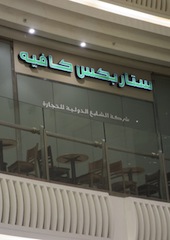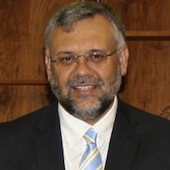Living Where You Don’t Make the Rules (Part III)
Getting Along Globally: A Practical Guide.
November 28, 2013

This is part three of a three-part series on Muslims, faith and cultural change in the age of globalization.
How do we who live in the middle send out a signal about the safety of the unknown? How do we say that there is nothing to fear in the unknown, but a lot to discover in it?
The first rule of living where you don’t make the rules is about embracing different identities. Why? Because then you see yourself connected to more and more people in the world.
Nelson Mandela allowed Muslims in South Africa to say, “I’m a Muslim,” and then to say, “but I’m a South African Muslim.” I can go further and say, ”I’m a South African Muslim of Malay origin.”
And then, I can go even further and say, “I am a South African Muslim of Malay origin who watches Manchester United play soccer.” Those are identities that don’t compete. They complement each other, they add to me as a person. They don’t subtract from you.
Being a South African does not subtract from being a Muslim. Being of Malay origin does not subtract from being a South African – and supporting an English soccer team does not subtract from being Malay.
The fundamental fault line between both sides is whether people can live with multiple identities – rather than to live or die by one. On the orthodox side and especially on the fundamentalist side, they want you to live or die by single identities. We have got to break free from that.
When you say, “I’m a Muslim American,” you are not only connected to the five million Muslims or whatever the number is in the United States. You are certainly connected to 350 million other people who also say that they are Americans.
When you recognize that you may be a Muslim American of African origin or Indian origin or Arab origin, you can enjoy all the food that comes from those regions as well as the other cultural joys of it.
Most important, you can also then say, “What I enjoy as an Arab, Turkish, Indian or African, I want to share with 350 million other people who I believe will enjoy it when they see it, taste it, experience it or feel it.”
To embrace multiculturalism
The second rule of living where you don’t make the rules says that you are better off embracing multiculturalism. In today’s world, monoculturalism and monocultures decay.
We now know that the great growth spurt in Islam was when Muslims encountered non-Arabs. When they went to Turkey, they produced Suleiman the Magnificent.
When Muslims went to Spain, they produced in Andalusia the most tolerant society the world had ever seen. When they went to India, they created architectural and cultural wonders. It is when former multi-cultures become monocultures that they decay.
Positive cultural collisions
In much the same way, the United States was at its most creative, its most vibrant and its most dynamic when all these different cultures were colliding and interacting every day. It’s when former multi-cultures become one and then find an overarching – sometimes an overbearing – single culture and single identity that they lose their edge.
Thus, they begin to fall behind. A national culture needs openness because it needs the different minds, eyes and ways of looking at things and thinking about things. That is what constantly re-invigorates a culture.
A large part of the inertia in Islam is because in a sense we have stopped colliding with other cultures. We need other cultures. When Islam collided with Africa in Fes, Morocco, these two forces produced the world’s first university.
When Islam collided with Africa in Timbuktu, Mali, it produced manuscripts of enormous learning and philosophy. When it collided with Africa at Al Azhar, it produced the world’s third university.
When Islam stopped colliding with others in wholesome ways and started to collide with others in destructive ways, it began to contract – not in numbers but in ideas. In a very real way, we’ve got to embrace multiculturalism because monocultures decay.
Providing to others what you wish for yourself
The third rule of thumb for living where you don’t make the rules is this: What you wish for yourself when you are powerless, you must be able to provide to others when you are powerful.
You can’t cry out for a mosque in New York – but not allow a church in Saudi Arabia. You have got to be able to maintain consistency and understand that unless you are consistently good, the sword cuts both ways.
If you don’t open that door to others, you will later open the door of intolerance to yourself. That happens whenever temporary powers change, when temporary majorities become minorities or temporary minorities become majorities. So what you want for yourself, you have got to be willing to give to others.
That means not making up all kinds of philosophical and theological gymnastics to come out of that obligation. It’s got to be clear-cut.
The path of bewilderment, not a “miracle”
This is the path of bewilderment that I think that Rumi invites us to. How do we allow ourselves to be bewildered and to act on the purest instinct that is within all of us?
If we follow that purest instinct, we will do the things that are right – and then maybe we won’t need rules. Then, human interactions will be a matter of negotiations.
That is what South Africa has really taught the world in the modern era: Words, compromise, dialogue used to be seen as something weak people do.
What we need to do is to invest those concepts with strength. We have seen the power of those three things in South Africa at work to make the transition from apartheid to democracy.
Wherever I go, people admire that transition, but they don’t just admire it they call it “a miracle.” They don’t just love Nelson Mandela, they call him a saint.
I challenge them: No, we don’t want you to see South Africa as a miracle and Nelson Mandela as a saint, because, if you do, you are in effect copping out. You are supplanting human agency with divinity. When you make something divine, you put it out of reach for yourself.
They then say, “Nelson Mandela was so great, he fomented a miracle.” What does that mean? It means, “I can’t do that.” It means that I cannot forgive my neighbor who has angered me.
If Nelson Mandela could forgive those who put him in jail for 27 years, what’s the problem between you and your neighbor? When you sanctify human actions, you abrogate your responsibility to do the same thing.
Therefore, I think what we need to do on a regular basis is to enjoy this bewilderment. It leads us to a wondrous path of being able to negotiate, to engage in dialogue and to make compromises on a daily basis.
We made fundamental compromises in South Africa and we still live with the aftermath of our history. We manage it every day.
In closing, I may well have been provocative, but hopefully that provocation will lead to healthier interactions.
Editor’s Note: This three part series is based on a talk given by Ambassador Rasool at the Rumi Forum in Washington, D.C.
Takeaways
I am a South African Muslim of Malay origin who watches Manchester United play soccer.
People can live with multiple identities – rather than live or die by one.
In today’s world, monoculturalism and monocultures decay.
The US was most creative, vibrant and dynamic when different cultures were colliding and interacting every day.
A large part of the inertia in Islam is because we have stopped colliding with other cultures.
When Islam started to collide with others destructively, it began to contract – not in numbers but in ideas.
If you don't open the door to others, you will later open the door of intolerance to yourself.
You can't call for a mosque in New York – but not allow a church in Saudi Arabia.
What South Africa has really taught the world in the modern era is the power of words, compromise and dialogue.
If Mandela could forgive those who jailed him for 27 years, what's the problem between you and your neighbor?

